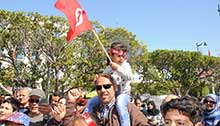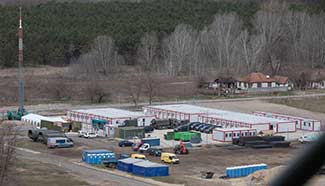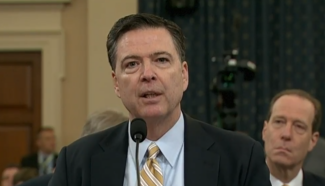BAGHDAD, March 21 (Xinhua) -- On an early Spring morning in March, warm breeze blows over Tigris, and a nearby minaret starts to broadcast the morning chanting, with the sky covered by thin, grey cloud.
The home of Ghanim Oraibi, a former Iraqi national football team player, lies on the river bank. In his cramped living room, misty light penetrates the gap of the curtains, and shines upon Ghanim's withered face.
In a picture he is holding, a young boy smiles as if he owns the world, but all the father has now are anger and despair.
Ghanim will never forget the midnight of July 3, 2016, when he was awakened by a huge blast at around 1:00 a.m. and desperately looking for his 17-year-old son out of a terrible foreboding.
Ghanim dialed his son's mobile phone again and again, and finally got through. But to his dismay, his son was cornered by fire and only spoke a few words before the phone went dead.
Since the U.S. army invaded Iraq on March 20, 2003, the cradle of ancient Mesopotamia civilization has been plagued by constant wars and chaos. Social fragmentation, sectarian killings, terrorist attacks, etc are all inflicting pain and panic to the Iraqi people.
On that nightmarish night, Ghanim's son finished Ramadan after sunset, and went to a nearby shopping mall with his brother-in-law. With Eid al-Fitr coming, the mall was pretty crowded.
An extremist drove an explosive-laden truck and detonated the explosives outside the mall. The whole street was filled with fire, bodies, and people's desperate screams.
Ghanim's son and son-in-law were among the nearly 300 people who were killed. Another 200 were injured.
Facing the broken country and family, Ghanim can't hold his anger and desperation.
Since 2003, terrorist attacks like that have become common in Iraq, where nearly one million civilians have been killed in wars or violence and about 5.5 million Iraqis have become refugees, according to statistics.
In the past dozen years, the seemingly never-ending war in Iraq claimed the lives of many members of Ghanim's family.
Ghanim, born in 1961, has had a passion for football since his childhood.
"I had my first jersey when I was in elementary school. I wore it for three days straight, and wouldn't take it off even when I was sleeping," Ghanim said, squinting out the window, as if looking back to his good old times.
With excellent skills, Ghanim was recruited by the national football team when he was a youth. He played for Iraq in the 1986 World Cup in Mexico as a leading player, and their team achieved the best result in the country's footballing history.
The proud moment in the 1986 World Cup is still alive in many Iraqis' memory, including Ghanim's.
However the good times did not last long, as Iraq soon tumbled into years of devastating warfare. The Iraq-Iran war and the Gulf War, along with U.N. economic sanctions, had broken Iraq.
The wars devastated the original political system of Iraq, shattering its political balance and social stability.
To suppress the rising anti-American forces in Iraq and control the new government, the United States re-distributed power among sects and ethnic groups. Many new political parties mushroomed overnight.
However, the so-called democratic parties are merely the spokespersons of different interest groups. Busy scrambling for power, the politicians cared little about the people and the country's future.
"Before the Americans came, Shiites and Sunnis could live in harmony," Ghanim said in anger, "But the wars have changed everything!"
After the Iraqi transitional government was established in 2005, the country's partisan fighting has become fiercer. During this period, domestic terrorist forces such as the infamous Islamic State took advantage of the chaos to grab territory in parts of the country, wreaking havoc in Iraq and posing threats to other countries as well.
On July 6, 2016, just three days after the death of Ghanim's son, the British government-commissioned Iraq Inquiry Committee concluded in a report that there was no evidence of Iraq possessing any weapons of mass destruction or having relations with the al-Qaida.
The truth is finally revealed. However, the long-awaited report did not and will not bring any relief to Iraq, because the country can't get its time back.
"More than 10 years have passed, what exactly have we got? Our country is broken, the government is in chaos, and numerous people have lost their family members like me," Ghanim said.
"If time can be turned back, I wish all these had not happened," Ghanim said, holding tightly the picture of his son in his arms once again.












